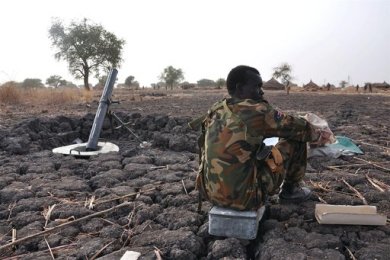South Sudan suspends talks accusing Sudanese army of new bombardments
July 20,2012 (WAU/KHARTOUM) — South Sudan on Friday accused the Sudan Armed Forces (SAF) of carrying out a fresh air strike in Northern Bahr el-Ghazal state triggering the suspension of ongoing talks in the Ethiopian town of Bahir Dar.

Friday’s aerial bombardment injured two civilians in Rumaker locality, North West of Aweil town, capital of Northern Bahr el Ghazal State, local and senior government officials within the country’s governing party said.
“Sudanese warplanes dropped bombs early this morning at 3:45AM in Rumaker area, wounding two civilians and destroying their settlements while they are sleeping,” Awet Kiir Awet, Aweil East County commissioner told Sudan Tribune on Friday.
“I have sent a vehicle so that victims are collected and brought to the hospital for medical care. And they have not yet returned”, he added.
Awet said the attack created panic amongst the local population who have returned to their farms following cessation of hostilities after the resumption of negotiations
“It was a surprise attack. This was why it created panic but the situation is now under control. It is now quiet. We do not have reports of ground attacks. It was the aerial bombardment”, said Awet.
Jackline Nyibol Benjamin Ajonga, a state minister of information also confirmed receiving reports of the bombardment adding she was still gathering more information as she was outside Aweil .
Sudan Tribune failed to reach the spokespersons of both Sudan People’s Liberation Army (SPLA) in Juba and SAF in Khartoum for confirmation and to get further details about the bombing.
The two parties, earlier in July endorsed a strategic approach where they reiterated their commitment to resort to peaceful means to settle their disputes in a comprehensive with the frame time set by the African Union road map and a UN resolution.
The meeting between the presidents of the two countries last week in the Ethiopian capital raised hopes that the two countries would reach a comprehensive agreement including the implementation of security arrangements.
Khartoum says that Darfur rebel groups are based in Northern Bahr el-Ghazal and continue to carry out regular attacks in neighbouring South Darfur and East Darfur states, but Juba denies such attacks.
In Bahir Dar the South Sudan delegation announced the suspension of the talks to protest against the airstrike and denounced Sudan’s violation of the UN Security Council resolution 2046 and the signed agreement between the two parties.
South Sudan’s delegation informed the AU High-Level Implementation Panel (AUHIP) of the attack as Khartoum did not react to the accusations.
Speaking to Al-Jazeera TV, the Sudanese army’s spokesperson denied the attack.
Al-Sawarmi Khaled said SAF did not carry any attack on the South Sudanese army despite the presence of SPLA troops in Tomsaha area in East Darfur state.
But Atif Kiir, spokesperson of the South Sudanese delegation said they decided to stop direct talks with Sudan after the news attack, stressing that any further talks should be in presence of the mediation. He added a written complaint was filed to the African Union mediation.
Atif further told Al-Jazeera that talks did not achieve real progress despite the presidential meeting between Bashir and Kiir.
Omer Dahab, the spokesperson of Sudanese negotiating delegation confirmed the suspension.
The talks resumed on 12 July 2012 in Bahir Dar, Ethiopia and the two sides expressed optimism over a possible agreement with the mediation speaking about a second presidential meeting between presidents Omer al-Bashir and Salva Kiir.
The mediation said that the two parties “have been submitting their positions on all issues” to the panel, said Eric Abibo Ngandu, AUHIP communication officer said in an email to Sudan Tribune.
Eric said before Juba’s decision to suspend the discussions that the talks would move to Addis Ababa over the weekend to proceed Monday 23 July 2012.
Last Thursday, after his return from Addis Ababa, the UN deputy Secretary-General Jan Eliasson said he insisted in his talks with the two Sudanese sides on the need to operationalise the buffer zone on the common border.
“The reason why this is so important is that I know from earlier crises that if the military forces are too close to each other, the risks are much higher that you would have military incidents that could easily escalate”, emphasised the former UN mediator for the Darfur crisis.
(ST)
